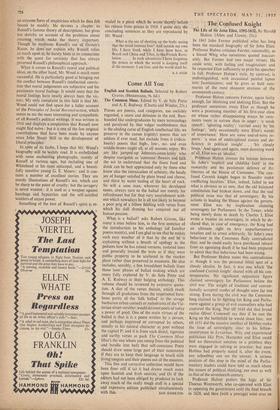Come All You
English and Scottish Ballads. Selected by Robert Graves. (Heinemann, 9s. 6d.) The Common Muse. Edited by V. de Sola Pinto and A. E. Rodway. (Chatto and Windus, 25s.) POEMS are poems, and categories, too owlishly regarded, a snare and delusion in the end. Bam- boozled like undergraduates by mere terminology and paralysed by that vulgar snobbishness that is the abiding curse of English intellectual life, we preserve in the canon (rightly) poems that are seldom if ever read, but exclude from it (ridicu- lously) poems that high-, low-, no- and even middle-brows might all, at all seasons, enjoy. We arc like jumped-up Johnnies-come-lately who despise marigolds as 'common' flowers and lack the wit to understand that the finest food and drink can be best appreciated only by those who know also the intoxication of sobriety, the heady joy of hunger satisfied by plain bread and cheese, and thirst by water tasting of the heart of rock. So will a sane man, whatever his developed tastes, always turn to the ballad not merely for refreshment but for that very nourishment with- out which nowadays he is all too likely to become a poor prig of a fellow fiddling with verses from which his dull droning has conjured out all human passion.
What is a ballad? asks Robert Graves, like many a man before him, in the first sentence of the introduction to his anthology (of familiar poems mainly), and I am glad to see that he makes such easy weather of it that by the end he is explaining without a breath of apology to the pedants how be has mixed versions, restored lines and generally treated the texts as if they were public property to be scattered in the market place rather than preserved in museums. He also includes, sensibly, a few broadsheet ballads from those later phases of ballad making which are more fully explored by V. de Sola Pinto and A. E. Rodway in their bulging anthology. This volume should be reviewed by extensive quota- tion. A diet of the verses therein, which reach through all gradations from the impersonal bare- bone purity of the 'folk ballad' to the savage barbarian urban comedy or melodrama of the Vic- torian street-versifier, would do most poets of today a power of good. One of the main virtues of the ballad is that it is a poem written by a person, and perhaps improved or corrupted by others, usually in his natural character as poet without the capital P; and it is from such direct, vigorous and earthy verses as pack The Common Muse (that's the one whom you sweep from the pedestal and bundle into bed) that self-conscious Poets should draw some large part of their sustenance if they are to keep their language in touch with living tongues and their poems out of the museum.
This fine and corrective collection would have been finer still if (a) it had drawn much more upon Scottish and Irish sources, and (b) if the editors had not been obliged by prudence to tuck away much of the really tough stuff in a special and expensive edition published simultaneously










































 Previous page
Previous page